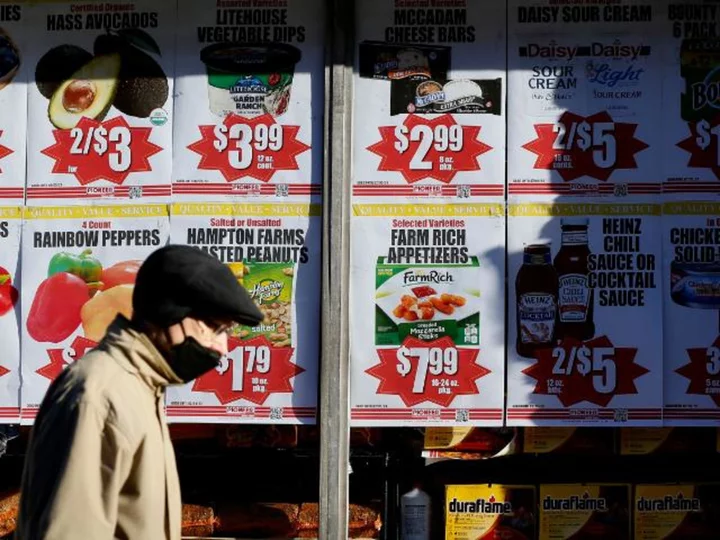Economic experts are once again ringing the alarm bells over an imminent downturn. A US recession is coming, they say, in the second half of 2023. That time frame begins less than three weeks from now.
JPMorgan CEO Jamie Dimon warned on Thursday of great economic danger lurking just over the horizon. Given the risks that lie ahead, he told Bloomberg news, "I would take a mild recession happily."
Billionaire investor Stan Druckenmiller didn't mince his words this week at the Sohn Investment Conference. A hard landing is coming, he cautioned, and "it's just naive not to be open-minded to something really, really bad happening."
For more than a year CEOs, economists, analysts and their kind have been warning of an imminent economic downturn, The economy, meanwhile, has remained relatively resilient through it all.
Things weren't great last year: Inflation hit a 40-year peak, gas prices were elevated, consumer sentiment plunged and markets fell by 20%. Still, the United States managed to avoid a recession.
"This has been the most predicted potential recession in memory," said Federal Reserve Bank of Richmond President Tom Barkin way back in January.
So why should we listen now?
There are two reasons, noted Paul Christopher, head of investment strategy at Wells Fargo: Higher interest rates and tightening credit.
The Federal Reserve has raised rates higher and more quickly than they have in decades, and some say that the ongoing US regional banking crisis is an early warning sign of stress on the system.
The Fed's own experts predicted in March that "the potential economic effects of the recent banking-sector developments," would lead to "a mild recession starting later this year."
Bank failures can make borrowing harder, which can curb spending and weigh on economic activity. A Fed survey, released Monday, confirmed that lenders are stiffening their standards in the wake of the banking collapses — demand for and supply of loans is now close to 2008 levels.
"The bottom line for markets is that with inflation still at 5%, well above the [Fed's] 2% inflation target, and the Fed not cutting rates anytime soon, credit conditions will continue to tighten and, as a result, a recession is coming that could be deeper or longer than the consensus currently expects," said Torsten Slok, chief economist at Apollo Global Management.
What comes next: The United States is approaching one year since inflation peaked at 9.1% in June of 2022. Historically, recession typically coincides with that peak, said Barry Gilbert, asset allocation strategist for LPL Financial. But that doesn't mean we're out of the woods.
If the economy were to go into recession in the second half of the year, we could chalk up the more delayed economic downturn to a Fed that was initially behind the curve in fighting inflation along with monetary policy acting with its typical lag," said Gilbert. Tailwinds from post-pandemic demand had also contributed to economic resilience, he added.
Jamie Dimon talks debt ceiling
Dimon sharply criticized former President Donald Trump on Thursday, saying the 2024 presidential candidate doesn't understand the debt ceiling and what is at stake. It is just "one more thing he doesn't know very much about," Dimon told Bloomberg Television.
Trump said in a CNN town hall Wednesday night that a default would be preferable to a result that doesn't stop the government "spending money like drunken sailors."
Economists and congressional leaders on both sides of the aisle say an extended default would hurt the US economy, triggering widespread unemployment, surging interest rates and sparking a global downturn.
Defaulting on the US debt would be "potentially catastrophic," Dimon said Thursday.
"The closer you get to it, you will have panic. Markets will get volatile, maybe the stock market will go down, the Treasury markets will have their own problems," he said. "This is not good."
Dimon also expressed concerns that US creditworthiness could be downgraded, as it was during the 2011 debt limit crisis.
Dimon told Bloomberg that he has been hunkering down in a so-called "war room" once a week in order to prepare JPMorgan Chase, the largest bank in the United States, for the possibility of a debt default.
As the June 1 "X-date" approaches — when the US Treasury could run out of cash and extraordinary measures they're currently using to pay all government obligations — Dimon said he will convene his war room more often. By May 21, he expects to meet every day.
Twitter to get a new boss
Elon Musk has been vowing to relieve himself of the top position at Twitter for some time. On Thursday, he took a step toward making good on that promise.
"Excited to announce that I've a new CEO for X/Twitter. She will be starting in ~6 weeks!" Musk said in a tweet.
But even as Musk prepares to step back from the CEO role, he will likely maintain significant control over the future direction of the company, reports my colleague Clare Duffy. After taking over the company in October, Musk cleared out the C-suite, dissolved the board and became both the CEO and sole director.
Musk has faced criticism for a series of policy changes at Twitter, which often came without clear justification and raised concerns about the impact on Twitter's users.
Musk — who runs or is involved in numerous other companies, including Tesla — has also faced criticism from Tesla shareholders concerned that he is distracted by Twitter.

